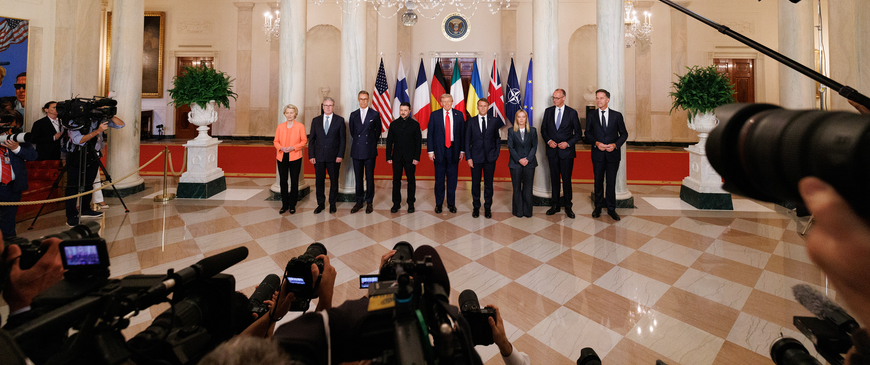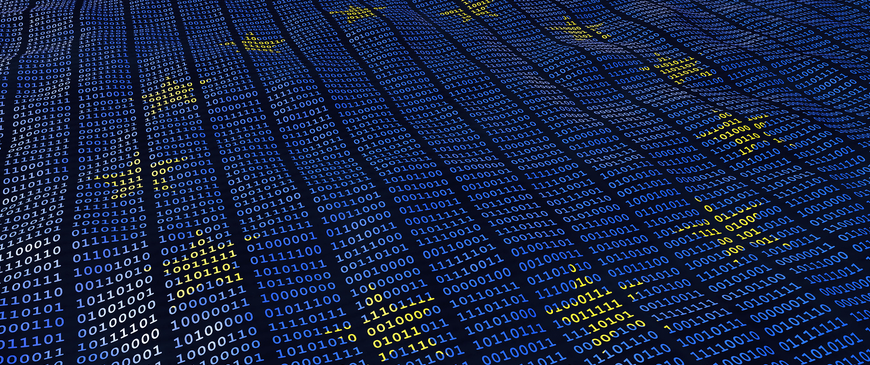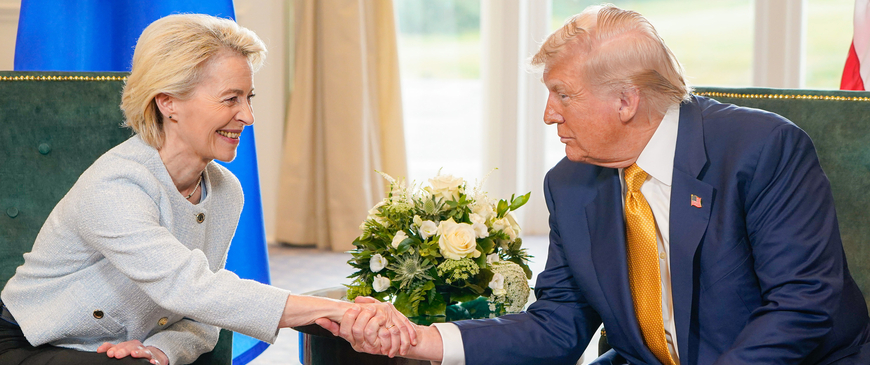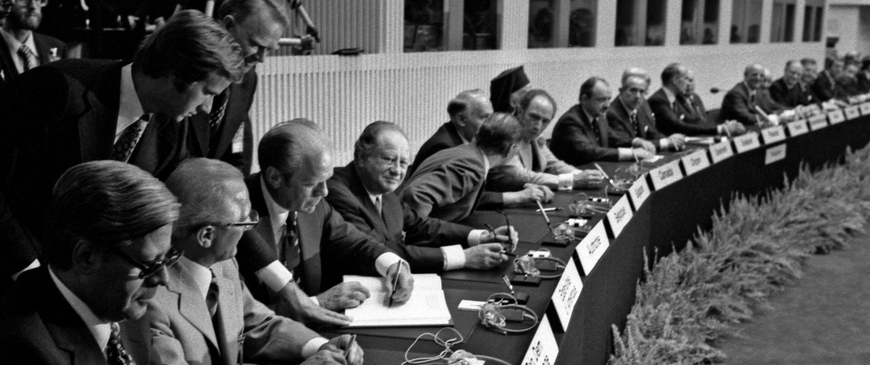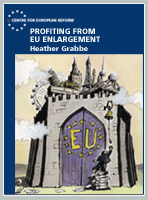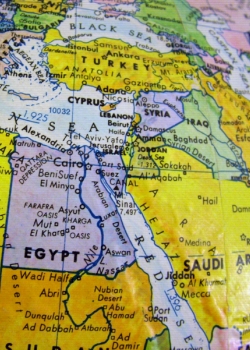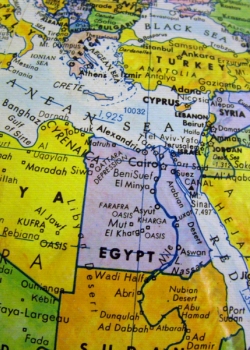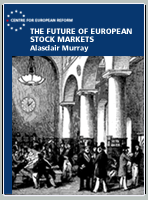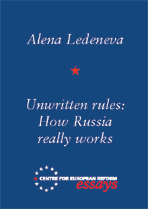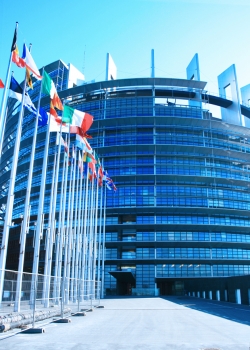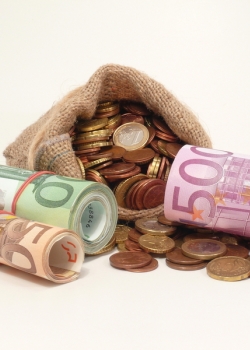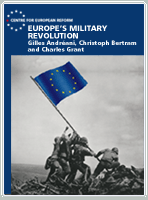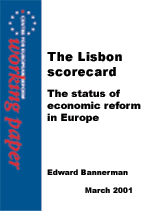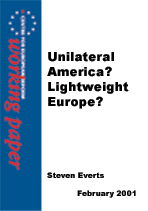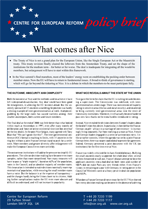Research
France, Germany and "hard-core" Europe
01 August 2001
In Paris, thinking on the future of the EU tends to focus on two French worries. One is the decline of the Franco-German relationship, and the consequent threat to French influence.
Speeding up European justice
01 August 2001
The European Union's legal system is one of the most significant contributors to European cohesion, prosperity and peace; yet it is also one of the Union's least recognised strengths.
Issue 19 - 2001
27 July 2001
- Policing global competition, Edward Bannerman
- France, Germany and "hard-core" Europe, Charles Grant
- Speeding up European justice, Matthew Heim
Profiting from EU enlargement
01 June 2001
Heather Grabbe weights up the risks of enlargement against the extra trade, investment and stability that enlargement will provide and argues that the price for the existing members will be small.
Time to act in the Middle East
01 June 2001
Once again the Middle East is facing a crisis with rising levels of hatred and violence on all sides. The death toll in the "second" intifadah stands at 450 Palestinians and around 100 Israelis and is rising. As a result, the prospects for a comprehensive peace accord are slipping ever further away.
Workers are entitled to consultation
01 June 2001
In the last issue of the CER Bulletin, James Wilson argued against the European Commission's proposal for a directive on employee information and consultation. Sadly, in order to do so, he resorted to many of the crude misrepresentations which are common currency among business opponents of the initiative.
We...
We...
EU should duplicate NATO assets
01 June 2001
Many American policy-makers are worried that the European Security and Defence Policy (ESDP) could undermine NATO and damage the transatlantic relationship.
Issue 18 - 2001
25 May 2001
- Time to act in the Middle East, Steven Everts
- Workers are entitled to consultation, John Monks
- EU should duplicate NATO assets, Kori Schake
The future of European stock markets
04 May 2001
Alasdair Murray look at how the absence of a single market in equities within the EU increases the cost of capital and restricts Europe's ability to close the economic gap with the United States.
Unwritten rules: How Russia really works?
04 May 2001
Western businesses and policy-makers must first grasp the "unwritten rules" that underpin the Russian economy, if they are to play a role in its transformation, according to this essay.
The stockholm scorecard
02 April 2001
The Stockholm European Council was supposed to focus on Europe's "new" economy and the goal of creating "the world's most dynamic and competitive knowledge-based economy by 2010".
An EU senate is superfluous
02 April 2001
The idea that the EU should create a second chamber for the European Parliament, composed of representatives from national parliaments, is a perennial favourite of member-state governments.
Don't legislate on consultation
02 April 2001
No-one who runs a business needs to be told that staff are a company's best ambassadors. There is ample evidence that a well-informed and motivated workforce can add value to the bottom line. Proper consultation is vital to ensuring long-term success. But if a firm wanted to improve its workforce...
Issue 17 - 2001
30 March 2001
- The stockholm scorecard, Edward Bannerman
- An EU senate is superfluous, Richard Corbett
- Don't legislate on consultation, James Wilson
Europe's military revolution
02 March 2001
The creation of the single European currency, a revolutionary innovation for the European Union (EU), has provoked tumultuous debate across the continent and beyond. Yet the EU's plans for a common defence policy have - thus far - attracted less attention.
The Lisbon scorecard: The status of economic reform in Europe
02 March 2001
It will be left to future historians to appreciate fully the significance of the Lisbon Summit of March 2000 in the economic evolution of Europe. But it is already possible to argue that its impact could be even more farreaching than that of the euro.
Unilateral America? Lightweight Europe? Managing divergence in transatlantic foreign policy
02 February 2001
The election of George W Bush as the new US President has caused uneasiness in Europe, both at the level of individual states and that of the European Union (EU). Bush has assembled an impressive team to work on foreign policy, including Colin Powell as the new Secretary of State,...
What comes after Nice
02 February 2001
Both the outcome at Nice and the methods used to achieve it have left widespread dissatisfaction. Any deal would have been good for enlargement, in allowing the EU to move ahead. But the unseemly spectacle of 15 countries scrambling for position was hardly a shining example of inter-governmentalism at work....
Turning East: Europe Courts Asia
01 February 2001
The United States has long cast its shadow over the formal meetings of Asian and European ministers. "How will this play in Washington?" was the unspoken caveat to the normally unexciting conclusions of most Asian-Europe Meetings (ASEM).
The January ASEM gathering of finance ministers in Kobe, Japan, suggests that this...
The January ASEM gathering of finance ministers in Kobe, Japan, suggests that this...
Opening Europe's final frontier
01 February 2001
The European Union must make space policy a key element of its agenda in the next few years. Otherwise it will have little chance of meeting its ambitious objectives for peace and prosperity in the coming decades.
Until recently, space policy was generally viewed either as an exercise in...
Until recently, space policy was generally viewed either as an exercise in...

